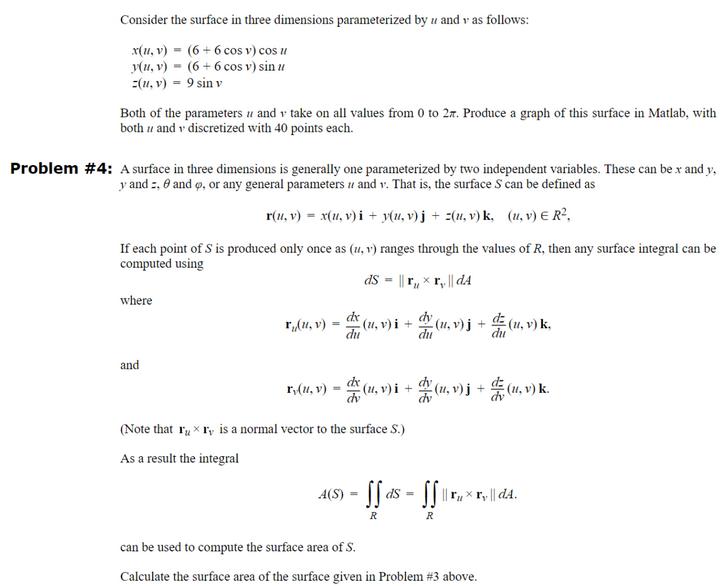Answered step by step
Verified Expert Solution
Question
1 Approved Answer
Consider the surface in three dimensions parameterized by and v as follows: x(u, v) = (6+6 cos v) cos u y(u, v) (6+6 cos

Consider the surface in three dimensions parameterized by and v as follows: x(u, v) = (6+6 cos v) cos u y(u, v) (6+6 cos v) sin u (u, v) = 9 sin v Both of the parameters and take on all values from 0 to 27. Produce a graph of this surface in Matlab, with both / and v discretized with 40 points each. Problem #4: A surface in three dimensions is generally one parameterized by two independent variables. These can be x and y, y and = 0 and , or any general parameters and v. That is, the surface S can be defined as r(u, v) = x(u, v) i + y(u,v) j + z(u, v)k. (u, v) ER. If each point of S is produced only once as (u, v) ranges through the values of R, then any surface integral can be computed using dS = || r, xr, || dA where and r(u, v) = (u, v) i + ( (u, v)j + (u, v) k. du du du (u, v) i + d(u, v)j + d(u, v) k k. r,(u, v) (Note that rury is a normal vector to the surface S.) X As a result the integral A(S) - SS R ||||| Fr ry || dA. R dS= can be used to compute the surface area of S. Calculate the surface area of the surface given in Problem #3 above.
Step by Step Solution
There are 3 Steps involved in it
Step: 1
To produce a graph of the given surface in MATLAB and calculate its surface area you can follow thes...
Get Instant Access to Expert-Tailored Solutions
See step-by-step solutions with expert insights and AI powered tools for academic success
Step: 2

Step: 3

Ace Your Homework with AI
Get the answers you need in no time with our AI-driven, step-by-step assistance
Get Started


